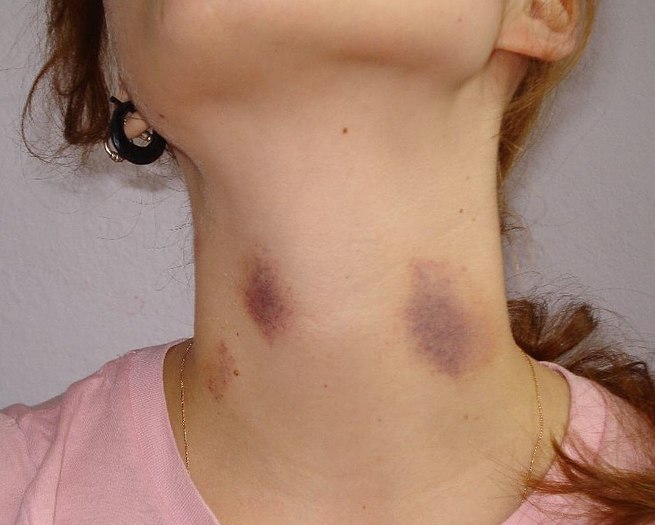Bruiseverb
(transitive) To strike (a person), originally with something flat or heavy, but now specifically in such a way as to discolour the skin without breaking it.
Bruiseverb
(transitive) To damage the skin of (fruit), in an analogous way.
Bruiseverb
(intransitive) Of fruit, to gain bruises through being handled roughly.
Bruiseverb
(intransitive) To become bruised.
Bruiseverb
(intransitive) To fight with the fists; to box.
Bruisenoun
(medicine) A purplish mark on the skin due to leakage of blood from capillaries under the surface that have been damaged by a blow.
Bruisenoun
A dark mark on fruit caused by a blow to its surface.
Bruiseverb
To injure, as by a blow or collision, without laceration; to contuse; as, to bruise one's finger with a hammer; to bruise the bark of a tree with a stone; to bruise an apple by letting it fall.
Bruiseverb
To break; as in a mortar; to bray, as minerals, roots, etc.; to crush.
Bruiseverb
To fight with the fists; to box.
Bruisenoun
An injury to the flesh of animals, or to plants, fruit, etc., with a blunt or heavy instrument, or by collision with some other body; a contusion; as, a bruise on the head; bruises on fruit.
Bruisenoun
an injury that doesn't break the skin but results in some discoloration
Bruiseverb
injure the underlying soft tissue of bone of;
Bruiseverb
hurt the feelings of;
Bruiseverb
break up into small pieces for food preparation;
Bruiseverb
damage (plant tissue) by abrasion of pressure;
Bruisenoun
an injury appearing as an area of discoloured skin on the body, caused by a blow or impact rupturing underlying blood vessels
Bruisenoun
a mark indicating damage on a fruit, vegetable, or plant.
Bruiseverb
inflict a bruise on (someone or something)
Bruiseverb
be susceptible to bruising
Bruiseverb
hurt (someone's feelings)
Bruiseverb
crush or pound (food)
Bruise
A bruise, also known as a contusion, is a type of hematoma of tissue, the most common cause being capillaries damaged by trauma, causing localized bleeding that extravasates into the surrounding interstitial tissues. Most bruises are not very deep under the skin so that the bleeding causes a visible discoloration.
Hickeynoun
A bruise-like mark made during petting by pressing the mouth to the skin on one’s partner’s body and sucking.
Hickeynoun
An object whose name is unknown or cannot be recalled.
Hickeynoun
(printing) A printing defect caused by foreign matter on the printing surface resulting in a ring where the ink is missing, appearing as a spot of ink surrounded by a halo.
Hickeynoun
Local swelling in a tissue area, especially skin, often due to injury.
Hickeynoun
A tool for making smooth, semicircular bends in conduit and pipe.
Hickeynoun
An unintended negative outcome or loss in regards to a deal or action, often preceded by the words "taking a ..." or "took a ... ".
Hickeynoun
A device used to adapt a lighting fixture for mounting in an outlet box, or on a pipe.
Hickeynoun
A red mark on the skin, caused by a passionate, sucking kiss at that location.
Hickeynoun
a doohickey.
Hickeynoun
a small inflamed elevation of the skin; a pustule or papule; common symptom in acne
Hickeynoun
a temporary red mark on a person's skin resulting from kissing or sucking by their lover
Hickeynoun
something whose name is either forgotten or not known
Hickeynoun
a gadget.
Hickeynoun
a love bite or pimple.
Hickeynoun
a blemish in printing, especially an area in a solid that has not been inked.
Hickey
A hickey, hickie or love bite in British English, is a bruise or bruise-like mark caused by kissing or sucking skin, usually on the neck, arm, or earlobe. While biting might be part of giving a hickey, sucking is sufficient to burst small superficial blood vessels under the skin.










